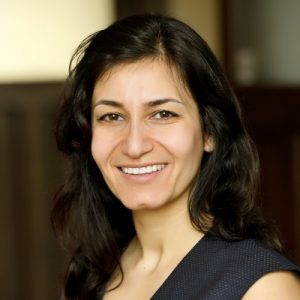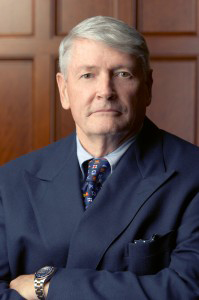 JOHN C. MALONE, Ph.D., earned a Master of Science degree in industrial management from The Johns Hopkins University in 1964, followed by a doctorate in operations research five years later, both from the School of Engineering. He received his undergraduate degree from Yale University in 1963.
JOHN C. MALONE, Ph.D., earned a Master of Science degree in industrial management from The Johns Hopkins University in 1964, followed by a doctorate in operations research five years later, both from the School of Engineering. He received his undergraduate degree from Yale University in 1963.
Widely recognized as a pioneer in communications and media, Dr. Malone is chairman of Liberty Media Corporation and Liberty Global Inc. The interests of Liberty Media include QVC, the Atlanta Braves, and Sirius XM Radio Inc. Liberty Global provides broadband distribution services and video programming services to subscribers in Europe, Latin America, and Australia. Dr. Malone is chairman emeritus of CableLabs and a member of the boards of Ascent Media, the Cato Institute, Discovery Communications, Expedia Inc., and Live Nation Entertainment. He was chief executive officer of Tele-Communications Inc. from 1973 to 1999, when TCI merged with AT&T.
In 2010, Dr. Malone donated $30 million to the G.W.C. Whiting School of Engineering for the construction of Malone Hall, an important interdisciplinary research facility on the Homewood campus.
This professorship is awarded to an outstanding member of the Whiting School’s faculty whose work crosses the borders of multiple disciplines.
Held by Russell H. Taylor
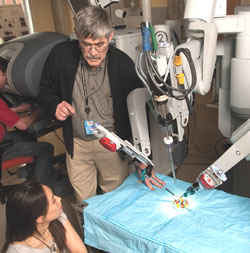 RUSSELL H. TAYLOR, the inaugural John C. Malone Professor, has more than 35 years’ experience in the fields of computer science, robotics and computer-integrated interventional medicine. He received a Bachelor of Engineering Science degree from The Johns Hopkins University in 1970 and a PhD in computer science from Stanford University in 1976.
RUSSELL H. TAYLOR, the inaugural John C. Malone Professor, has more than 35 years’ experience in the fields of computer science, robotics and computer-integrated interventional medicine. He received a Bachelor of Engineering Science degree from The Johns Hopkins University in 1970 and a PhD in computer science from Stanford University in 1976.
From 1976 to 1995, Dr. Taylor worked at IBM’s T.J. Watson Research Center, where he developed the AML robot language and managed the Automation Technology Department and, later, the Computer-Assisted Surgery Group.
In 1995, Dr. Taylor returned to Johns Hopkins, where he is a professor of computer science. He holds joint appointments in mechanical engineering, radiology, and surgery and directs the Engineering Research Center for Computer-Integrated Surgical Systems and Technology.
Dr. Taylor has authored more than 300 peer-reviewed publications, 13 book chapters, and a book, and holds 30 U.S. patents. Among his numerous honors and awards are being named a fellow of the IEEE, AIMBE, and the MICCAI Society, and receiving the IEEE Robotics Pioneer Award and the MICCAI Society Enduring Impact Award.
Held by Ilya Shpitser
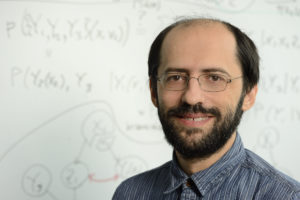 ILYA SHPITSER is a John C. Malone Assistant Professor in the Department of Computer Science and is a core faculty member in the Malone Center for Engineering in Healthcare.
ILYA SHPITSER is a John C. Malone Assistant Professor in the Department of Computer Science and is a core faculty member in the Malone Center for Engineering in Healthcare.
Dr. Shpitser studies causal inference, which is the discovery of cause effect relationships from observational data, using appropriate assumptions, and missing data, particularly using graphical models. Recent applications of his work have included developing methods to define difference between causation and association in observational medical data. In collaboration with clinicians in the School of Medicine, he applies these methods to data analysis problems in health care, medicine, and epidemiology.
Previously, Dr. Shpitser was a lecturer in statistics at the University of Southampton, and a research associate at the causal inference group headed by James M. Robins at the Harvard School of Public Health. He received his PhD under the supervision of Judea Pearl at the University of California, Los Angeles.
Held by John W. Krakauer
 JOHN W. KRAKAUER, the John C. Malone Professor in the departments of Neurology, Neuroscience, and Physical Medicine and Rehabilitation and a member of the Malone Center for Engineering in Healthcare, is recognized for his study of the human motor system in health and disease.
JOHN W. KRAKAUER, the John C. Malone Professor in the departments of Neurology, Neuroscience, and Physical Medicine and Rehabilitation and a member of the Malone Center for Engineering in Healthcare, is recognized for his study of the human motor system in health and disease.
Dr. Krakauer’s achievements have included bringing a motor learning paradigm, called visuomotor rotation, into the neuroscience mainstream, discovering the proportional recovery rule for stroke, characterizing a sensitive period of heightened plasticity after stroke, developing new conceptions of motor skill, and devising the notion of implicit motor motivation. His interest in the interface between neuroscience and the areas of philosophy, sport, and art has led to his founding the video gaming company, Max and Haley, and the Johns Hopkins-based project named KATA. Both of these efforts are focused on the creation of customized software and hardware to revolutionize the care of patients with neurological injury and disease, including through the creation of video gaming and of animations that are based on the real physics of animal movement.
Before coming to Johns Hopkins, Dr. Krakauer was a tenured professor in the Departments of Neurology and Neuroscience at Columbia University. He received his MD from Columbia University College of Physicians and Surgeons and completed his internship in Internal Medicine at the Johns Hopkins Hospital and his residency in neurology at the Neurological Institute of New York at Columbia University.
Held by Jeremy D. Brown
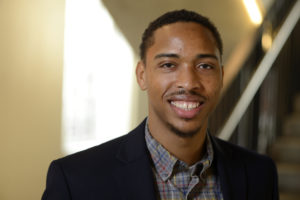 JEREMY D. BROWN, joined the Whiting School of Engineering as a John C. Malone Assistant Professor in professor in the Department of Mechanical Engineering and he is a core faculty member of the Malone Center for Engineering in Healthcare.
JEREMY D. BROWN, joined the Whiting School of Engineering as a John C. Malone Assistant Professor in professor in the Department of Mechanical Engineering and he is a core faculty member of the Malone Center for Engineering in Healthcare.
Dr. Brown’s research focuses on the interface between humans and robots, with a specific interest in medical applications and haptic feedback. Brown seeks to develop novel haptic interfaces to use with upper-limb prosthetics and with minimally-invasive surgical robotics. Research Brown is pursing in collaboration with colleagues at the Johns Hopkins School of Medicine, includes developing interfaces to provide haptic feedback to surgeons could be used to as a training platform for robotic surgery.
Dr. Brown graduated from Atlanta University Center’s Dual Degree Engineering Program, earning BS degrees in Applied Physics and Mechanical Engineering from Morehouse College and the University of Michigan. Brown obtained his MS and PhD degrees in mechanical engineering from the University of Michigan. After completing his PhD, he joined the Haptics Research Group at the University of Pennsylvania as a Postdoctoral Research Fellow.
Held by Chien-Ming Huang
 CHIEN-MING HUANG, Ph.D., a John C. Malone Assistant Professor in the Department of Computer Science, studies human-machine teaming and creates innovative, intuitive, personalized technologies to provide social, physical, and behavioral support for people with a variety of abilities and characteristics, including children with autism spectrum disorders.
CHIEN-MING HUANG, Ph.D., a John C. Malone Assistant Professor in the Department of Computer Science, studies human-machine teaming and creates innovative, intuitive, personalized technologies to provide social, physical, and behavioral support for people with a variety of abilities and characteristics, including children with autism spectrum disorders.
Huang directs Johns Hopkins’ interdisciplinary Intuitive Computing Laboratory and is a member of JHU’s Malone Center for Engineering in Healthcare and the Laboratory for Computational Sensing and Robotics. An expert in human-robot and human-computer interaction, Huang is particularly passionate about using novel technologies to help special-needs populations. Drawing on human-computer interaction (HCI), robotics, and artificial intelligence (AI), Huang’s research has significant applications in healthcare, education, and manufacturing.
His lab develops interactive robot systems that work cooperatively with people to increase task performance and enhance user experience. Specifically, Huang’s team focuses on deciphering human behavioral cues (e.g., eye gaze) for recognizing task intent, synthesizing intuitive robot behaviors to facilitate collaborative activities, and developing interfaces and methods for people to re-skill robots to perform custom tasks.
Huang, who joined the Hopkins faculty in 2017, has received several awards, including being named a prestigious John C. Malone Assistant Professor at JHU. In 2018, he was selected for the Association for Computing Machinery’s (ACM) Conference on Human Factors in Computing Systems (referred to as CHI) Early Career Symposium and its New Educators Workshop for the ACM’s Special Interest Group on Computer Science Education. As a PhD candidate, Huang received “Best Paper Runner-up” and “Best Student Poster Runner-up” honors at the 2013 Robotics: Science and Systems (RSS) conference and was named a 2012 Human Robot Interaction (HRI) Pioneer.
Held by Suchi Saria
 SUCHI SARIA, Ph.D., is the John C. Malone Associate Professor of Computer Science. Her interests span machine learning, computational statistics, and its applications to domains where one has to draw inferences from observing a complex, real-world system evolve over time. The emphasis of her research is on Bayesian and probabilistic graphical modeling approaches for addressing challenges associated with modeling and prediction in real-world temporal systems. In the last seven years, she has been particularly drawn to computational solutions for problems in health informatics (see her recent article on this topic) as she sees a tremendous opportunity there for high impact work.
SUCHI SARIA, Ph.D., is the John C. Malone Associate Professor of Computer Science. Her interests span machine learning, computational statistics, and its applications to domains where one has to draw inferences from observing a complex, real-world system evolve over time. The emphasis of her research is on Bayesian and probabilistic graphical modeling approaches for addressing challenges associated with modeling and prediction in real-world temporal systems. In the last seven years, she has been particularly drawn to computational solutions for problems in health informatics (see her recent article on this topic) as she sees a tremendous opportunity there for high impact work.
Prior to joining Johns Hopkins, she earned her PhD and Masters at Stanford in Computer Science working with Dr. Daphne Koller. She also spent a year at Harvard University collaborating with Dr. Ken Mandl and Dr. Zak Kohane as an NSF Computing Innovation Fellow. While in the valley, she also spent time as an early employee at Aster Data Systems, a big data startup acquired by Teradata. She enjoys consulting and advising data-related startups. She is an investor and an informal advisor to Patient Ping.
Held by Scott L. Zeger
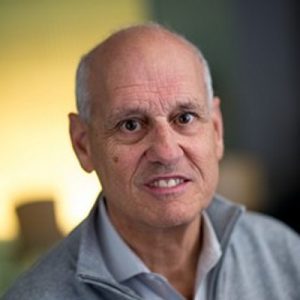 SCOTT L. ZEGER, Ph.D., is the John C. Malone Professor of Biostatistics at the Johns Hopkins Bloomberg School of Public Health and a Professor of Medicine at the School of Medicine. From 2008-2013, he was Vice Provost for Research to represent the university in all matters related to the research and scholarship of its faculty and students. In 2009, Dr. Zeger was interim Provost of the University. From 2012-2016, Dr. Zeger was the inaugural director of Hopkins inHealth, a signature initiative of the Johns Hopkins University, Health System and Applied Physics Laboratory to bring modern biological and data sciences to the practice of American medicine and public health.
SCOTT L. ZEGER, Ph.D., is the John C. Malone Professor of Biostatistics at the Johns Hopkins Bloomberg School of Public Health and a Professor of Medicine at the School of Medicine. From 2008-2013, he was Vice Provost for Research to represent the university in all matters related to the research and scholarship of its faculty and students. In 2009, Dr. Zeger was interim Provost of the University. From 2012-2016, Dr. Zeger was the inaugural director of Hopkins inHealth, a signature initiative of the Johns Hopkins University, Health System and Applied Physics Laboratory to bring modern biological and data sciences to the practice of American medicine and public health.
Professor Zeger is author or co-author of 3 books and more than 200 scientific articles. Science Watch identified Dr. Zeger as one the 25 most cited mathematical scientists. He conducts statistical research on regression analysis for correlated responses as occur in surveys, time series, longitudinal or genetics studies. He has made substantive contributions to our understanding of the health effects of smoking and air pollution, infectious diseases in children, and other topics.
Professor Zeger has served as expert witness to the U.S. Department of Justice and several states in their civil suits against the tobacco industry and as a member of the Board of Scientific Advisors for the Merck Research Laboratory. He is a member of the Springer-Verlag editorial board for statistics and was the founding co-editor of the Oxford University Press journal Biostatistics. Dr. Zeger has been awarded an honorary doctorate from Lancaster University in England, elected Member of the National Academy of Sciences’ Institute of Medicine, Fellow of the American Association for the Advancement of Science and of the American Statistical Association. He and colleague Kung-Yee Liang were jointly awarded the 2015 Karl Pearson Prize by the International Statistical Institute. The Bloomberg School Student Assembly has awarded Dr. Zeger with Golden Apples for excellence in teaching. In 2018, he was the inaugural recipient of the Bloomberg School’s Faculty Mentoring Award.
Held by Muyinatu A. Lediju Bell
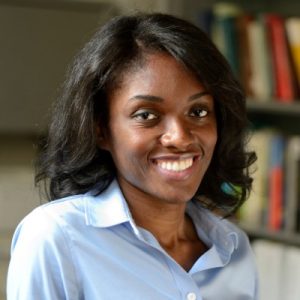 MUYINATU A. LEDIJU BELL, Ph.D., is the John C. Malone Assistant Professor of Electrical and Computer Engineering. She leads a highly interdisciplinary research program that integrates optics, acoustics, robotics, electronics, and mechanics, as well as signal processing and medical device design, to engineer and deploy innovative biomedical imaging systems that simultaneously address unmet clinical needs and significantly improve the standard of patient care. As the director of the Photoacoustic and Ultrasonic Systems Engineering (PULSE) Lab, Dr. Bell develops theories, models, and simulations to investigate advanced beamforming techniques for improving ultrasonic and photoacoustic image quality. In parallel, she designs and builds novel light delivery systems for photoacoustic imaging and incorporates medical robots to improve operator maneuverability and enable standardized procedures for more personalized medicine. The technologies developed in her lab are then interfaced with patients to facilitate clinical translation. These technologies have applications in neurosurgical navigation, cardiovascular disease, women’s health, and cancer detection and treatment.
MUYINATU A. LEDIJU BELL, Ph.D., is the John C. Malone Assistant Professor of Electrical and Computer Engineering. She leads a highly interdisciplinary research program that integrates optics, acoustics, robotics, electronics, and mechanics, as well as signal processing and medical device design, to engineer and deploy innovative biomedical imaging systems that simultaneously address unmet clinical needs and significantly improve the standard of patient care. As the director of the Photoacoustic and Ultrasonic Systems Engineering (PULSE) Lab, Dr. Bell develops theories, models, and simulations to investigate advanced beamforming techniques for improving ultrasonic and photoacoustic image quality. In parallel, she designs and builds novel light delivery systems for photoacoustic imaging and incorporates medical robots to improve operator maneuverability and enable standardized procedures for more personalized medicine. The technologies developed in her lab are then interfaced with patients to facilitate clinical translation. These technologies have applications in neurosurgical navigation, cardiovascular disease, women’s health, and cancer detection and treatment.
Dr. Bell obtained a Ph.D. in Biomedical Engineering from Duke University (2012) and a B.S. in Mechanical Engineering with a minor in Biomedical Engineering from the Massachusetts Institute of Technology (2006). In addition, she spent a year abroad as an academic visitor at the Institute of Cancer Research and Royal Marsden Hospital in the United Kingdom (2009-2010). Prior to joining the faculty, Dr. Bell was a postdoctoral fellow with the Engineering Research Center for Computer-Integrated Surgical Systems and Technology at Johns Hopkins University. She published over 40 scientific journal articles and conference papers, holds a patent for SLSC beamforming, and is the recipient of numerous awards, grants, and fellowships, including the prestigious NIH K99/R00 Pathway to Independence Award. She was selected by MIT Technology Review as one of the top 35 Innovators Under 35 in the year 2016.
 JOHN C. MALONE, Ph.D., earned a Master of Science degree in industrial management from The Johns Hopkins University in 1964, followed by a doctorate in operations research five years later, both from the School of Engineering. He received his undergraduate degree from Yale University in 1963.
JOHN C. MALONE, Ph.D., earned a Master of Science degree in industrial management from The Johns Hopkins University in 1964, followed by a doctorate in operations research five years later, both from the School of Engineering. He received his undergraduate degree from Yale University in 1963.
 ILYA SHPITSER is a John C. Malone Assistant Professor in the Department of Computer Science and is a core faculty member in the Malone Center for Engineering in Healthcare.
ILYA SHPITSER is a John C. Malone Assistant Professor in the Department of Computer Science and is a core faculty member in the Malone Center for Engineering in Healthcare. JOHN W. KRAKAUER, the John C. Malone Professor in the departments of Neurology, Neuroscience, and Physical Medicine and Rehabilitation and a member of the Malone Center for Engineering in Healthcare, is recognized for his study of the human motor system in health and disease.
JOHN W. KRAKAUER, the John C. Malone Professor in the departments of Neurology, Neuroscience, and Physical Medicine and Rehabilitation and a member of the Malone Center for Engineering in Healthcare, is recognized for his study of the human motor system in health and disease. JEREMY D. BROWN, joined the Whiting School of Engineering as a John C. Malone Assistant Professor in professor in the Department of Mechanical Engineering and he is a core faculty member of the Malone Center for Engineering in Healthcare.
JEREMY D. BROWN, joined the Whiting School of Engineering as a John C. Malone Assistant Professor in professor in the Department of Mechanical Engineering and he is a core faculty member of the Malone Center for Engineering in Healthcare.